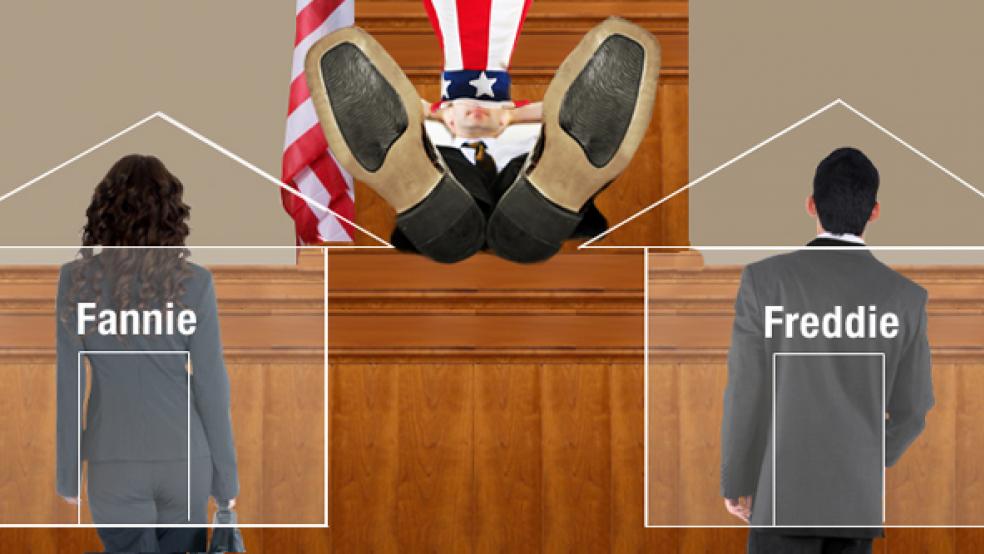Every day seems to bring fresh bad news about the housing market. Sales are down, foreclosures are up, mortgages are harder to obtain. Americans had better get used to it -- the housing mess is unlikely to see a near-term fix.
Since taking over mortgage giants Fannie Mae and Freddie Mac in the heat of the 2008 financial crisis, the government now stands behind about 95 percent of U.S. residential mortgages. Without any policy changes, this course will push the national debt to $30 trillion in ten years, according to Peter J. Wallison, a fellow at the American Enterprise Institute.
It could get even worse. CoreLogic estimates that 10.9 million homeowners owe more on their mortgages than the property is worth, or 22.5 percent of all outstanding loans. Amherst Securities Group projects that without further policy changes, 10.4 million additional borrowers are likely to default on their mortgages.
Policy experts agree that the situation poses unacceptably high risks to taxpayers and that private investors must eventually replace the federal government in housing finance -- but they disagree on both the path forward and how the future system will be structured.
"It certainly feels as though we are stalled," said Susan Wachter, professor of financial management at the University of Pennsylvania's Wharton School, before testifying to Congress on housing finance on Thursday morning. "The most important thing that has to happen is that there needs to be consensus."
Unfortunately for U.S. taxpayers and homeowners, there's little hope that the deadlock will break. Here are four reasons that the mortgage mess won't get fixed any time soon.
- Congressional Reform is for Dreamers: When Congress passed comprehensive financial reform last year, the future of Fannie and Freddie was the biggest piece that lawmakers failed to address, largely for lack of political will. But with presidential election season in full swing, experts predict housing finance legislation will have to wait at least until 2013, at the earliest.
"Ultimately you need legislation to have a defined role for the future of Fannie and Freddie," said Phillip Swagel, public policy professor at the University of Maryland. "I don't see that happening in 2011 or 2012."
Even the acting director of the Federal Housing Finance Agency expressed frustration at the lack of progress since the agency put Fannie and Freddie into conservatorship in 2008. "After three years, there still is no clear direction as to what legal and institutional structures will replace the enterprises and their central position in the housing finance market," FHFA acting director Edward DeMarco told a mortgage group last month.
- Fannie and Freddie's Vital Role: Well then, you might say, why can't we junk Fannie and Freddie and let the private sector take over? Not so fast. Unlike Europe, where banks have enough assets and capital to hold the bulk of mortgage debt, the U.S. housing finance system relies on repackaging mortgage into securities and selling them to a wide range of investors. Right now, Fannie and Freddie are the only institutions willing to play that role, known as securitization.
U.S. banks possess about $13 trillion in total assets, about the same magnitude as the $10.5 trillion of outstanding mortgage debt, said Michael Farrell, chief executive of Annaly Capital Management, the largest residential real estate investment trust, in testimony to Congress at Thursday's hearing of the trade subcommittee of the House Financial Services Committee.
If Fannie and Freddie were eliminated, the U.S. housing system could lose as much as $4 trillion in investor funding, causing prices to plummet and costs to rise, Farrell said. "A housing finance system that does not include the homogeneity and liquidity made possible by government involvement will be smaller and more expensive, with potentially negative consequences for home prices and homeowner flexibility," he testified.
- Limited Policy Tools: But short of congressional action, regulators and the White House have limited tools for reducing the role of Fannie and Freddie, giving relief to underwater homeowners and boosting the sagging real estate market.
"Policy makers have a lot of tools to move us toward the vision of what the housing finance system of the future looks like," said Sarah Rosen Wartell, executive vice president at the Center for American Progress. "Any one change is no panacea for the housing market."
Regulators are attempting to trim the government role through steps like letting the limits decline for loans that qualify for government insurance and repackaging by Fannie and Freddie. That Oct. 1 change will increase the number of jumbo loans that must be financed outside the government-backed system, putting pressure on the higher end of the market.
They're also looking at increasing the cost of government insurance and sharing the risk of mortgages held by Fannie and Freddie, according to DeMarco. Finally, they are exploring how to sell or rent out houses that have been foreclosed upon. "We have an enormous amount of housing that is in the sales pipeline," Wartell said. "The idea is to figure out how you can facilitate a bulk sale or joint venture."
The Obama administration has struggled to deliver foreclosure relief, leading to criticism even from Democratic lawmakers. The Emergency Homeowners Loan Program ended Sept. 30 with only $500 million allocated out of the expected $1 billion in available assistance, due to difficulty qualifying borrowers and setting up the program.
The Home Affordable Mortgage Program -- initially targeted to help up to 4 million homeowners -- has only saved 700,000 homeowners from foreclosure. The administration is expected soon to announce a revamped HAMP aimed at making more underwater borrowers eligible to refinance into lower-cost loans.
Some possible changes include waiving the loan-level pricing adjustments, allowing higher loan-to-value ratios, helping lenders who are reluctant to take on additional liability through the representations and warranties clause, and replacing the borrower-funded appraisal with another method of determining the house's value, Wartell said.
- Market Forces Are Politically Unpalatable: Ultimately, even if policy makers agree on a solution to the housing finance system, the transition will impose costs on homeowners and investors making it hard for politicians to move forward in this economy.
Interest rates are artificially low because of the government mortgage subsidy and the Federal Reserve's attempts to stimulate the economy. In order for private investors to replace Fannie and Freddie in buying and repackaging mortgages, the government role will need to decline, impacting the real estate market, Swagel said.
"Anyone who wants to move away from where we are now is going to raise the price of government insurance and reduce the quantity of government insurance that's offered," he said. "As you turn those policy levers, interest rates will rise and mortgage availability will fall. It's an issue as a society how far are we willing to let interest rates go."





